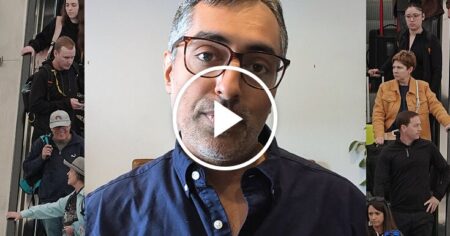Dr. Adnan Munkarah is a gynecologic oncologist—and a good one, mind you. His work in the specialty has been internationally recognized for its impact, and there was a time when he could see himself caring for patients indefinitely.
But today, Munkarah leads a different life than the one he envisioned in medical school. He serves as chief clinical officer and president of the care delivery system at Henry Ford Health: a five-hospital, 3,500-physician enterprise based in Detroit.
When I connected with Munkarah in June, he described a “gradual” transition to the top. He was recruited to chair the women’s health department, then tapped to lead the medical group’s finance committee. Eventually, he found himself helming its board of governors.
“I started taking some of these projects while continuing to focus where I wanted to focus [in clinical care], but it is almost like they started pulling more and more,” Munkarah told Newsweek. “Before I knew it, our CEO at the time asked me to be the chief physician executive for the system.”
His story isn’t unfamiliar. More doctors are ascending the ranks at health systems, specifically sought out for their front-line expertise. Multiple studies link physician-led hospitals with better outcomes, including higher quality scores and patient experience ratings.
However, it isn’t always easy for doctors to leave their practice behind. A decade ago, Munkarah couldn’t have imagined himself on the executive leadership team: “Absolutely not, because at that time, all I wanted to do is make a difference in clinical care.”
He’s since softened on the title—and as the only physician reporting directly to the CEO of Henry Ford Health, he’s finding new ways to deliver that impact.
Here’s what Munkarah told Newsweek about his experience as the sole doctor in the C-suite.
Editor’s note: Interview has been edited for length and clarity.
Do you find yourself referring to your experience as a physician when making hard decisions and communicating them to clinical teams?
Trust as a physician is extremely important. If your patient does not trust you, you are not going to be able to work with them to improve their health. I loved my practice, and I think my patients loved me—and I still love them.
But trust becomes more important when you are an executive, because now we need to instill trust in a bigger team and a bigger enterprise. You need to create trust among a lot of people. In order to do that, you need to kind of make sure that you always have the courage to make the right decision, that you are transparent and honest in what you need to do, and you need to make sure that you are setting clear expectations for people.
[Another lesson I] learned from being a physician is that when you need to communicate a tough decision, you need to have speed for decision making. As a physician, there are times where if I don’t make the decision at the right time, I can endanger somebody’s life. It’s the same in the business of medicine—you cannot continue to drag your feet, especially at this time with health care. There are times we need to make decisions that are timely decisions. There are times where we need to take our time, but we should not be paralyzed by analysis.
I’ve also learned over time that we need to say things multiple ways. I learned it before when talking to patients because I was dealing with cancer, and when somebody has cancer the first time, it’s not an easy diagnosis to give them. You need to kind of take a deep breath and repeat it, talk about it…have both empathy and patience.
It’s not any different when you are dealing with hard [executive] decisions. Continue to listen and communicate, but again, be consistent, be transparent and be courageous.
You’ve said that your “why” has remained consistent throughout your career: providing good outcomes for patients and improving community health. But has your approach to that “why” changed since taking on a leadership role?
Most of the time as a physician, you want to take things in your hands. I want to be taking charge.
When you get to be an executive leader, [you are] not the expert in everything you do anymore. I would be naive to believe that I am an expert in all these things I am responsible for. So having the right team is extremely important. You understand that you need to delegate and rely on people who know things better than you.
When I was still in full practice in gynecological cancer, I knew every single piece of data, I was on top of doing cancer research. Now, I would need to know everything about human resources and corporations and all the service lines that I cover. I’m not an expert at all these things. So I need to feel comfortable being vulnerable and saying that I do not know everything, but I have the right people in the team to delegate to. My role becomes a more supportive role to facilitate their ability to use their expertise to implement things.
Do you believe that physicians in leadership roles can help mediate some skepticism that clinical workers might feel toward the executive suite?
I think they can. But I always joke with my colleagues because as chair of a department, even as chief medical officer [of the medical group], the clinicians look at you as a clinician. The minute you get into the C-suite, they start looking at you as a suit—irrespective of whether you’ve changed or not.
On the other hand, the executive team continues to look at you as a physician.
Joking aside, I have practiced for a long time. People trust your clinical ability and you are able to let people know that you’ve been there and you understand what they are living through. But all our clinical leaders and I know it is not by any means; it is very limited practice that I have. I still go to the clinic and see my patients, but I’m not doing surgery now.
I have been in the system for 16 years, so I know a lot of people. I’ve been in many hospitals, I know the nursing leaders, I know some of the people in transportation, nutrition and dietary. And because I’ve been there, there is familiarity, a connectedness that exists. I think it does make a difference when people see that you’ve been in their shoes, you’ve worked with them before, you did not get transported into an executive suite without understanding what happens in the trenches.
Are there specific challenges facing the health care industry that could benefit from a physician-led response? What innate capabilities do physicians have that would aid those initiatives?
Absolutely. My bias is that our current health care system is not sustainable. It is not sustainable for our younger generation. It is not sustainable for our grandchildren. We have exceeded 18 percent of our gross domestic product being spent on health care [in 2020 and 2021]. We know the data regarding where Medicare will end up with respect to funding.
This is why I took the job, because I feel we [as physicians] cannot continue to complain that health care is expensive, people are not getting paid enough. I feel that as physician leaders, we need to be sitting around the table and trying to find the solution to fix what we need to fix in health care.
I also strongly believe that we need to start focusing more on value-based care, where we are looking to drive the best outcomes while controlling the cost of revenue to control it. This sometimes is not a very popular stance, but I really believe if we do not push hard to go in that direction, we are not going to be able to leave a health care system that’s sustainable for our children.
I feel that the role of physician leaders is to be sitting with their colleagues who know finance, who know operations, and drive what we need to drive going forward. It’s not “us” versus “them,” “physician” versus “hospital.” I strongly believe that we have smart people who can solve these problems by coming together.
Read the full article here














